
Related
Guests
- Sharif Abdel Kouddouscorrespondent for The Night Won’t End on Fault Lines, Al Jazeera English’s award-winning documentary program.
- Kavitha Chekurujournalist and director of The Night Won’t End, a documentary for Al Jazeera English’s Fault Lines.
The Night Won’t End, a new documentary from Al Jazeera English, takes an in-depth look at attacks on civilians by the Israeli military in Gaza and the United States’ role in the war. The film follows three Palestinian families as they recount the horrific experiences they have endured under relentless Israeli assault, including the family of 6-year-old Hind Rajab, the young Palestinian girl who made headlines when it emerged in January that she had been trapped in a car with family members killed by Israeli ground troops, and the Salem family, who first lost dozens of family members in an Israeli airstrike and then additional family members who were executed by Israeli soldiers. We play clips from the documentary and speak to journalists Kavitha Chekuru and Sharif Abdel Kouddous, the director and correspondent on The Night Won’t End, respectively. We also discuss the plight of journalists in Gaza and U.S. complicity in Israel’s war. “There’s no question that U.S. weapons have killed civilians in Gaza,” says Kouddous. “This violates both international humanitarian law and domestic law.”
Transcript
NERMEEN SHAIKH: As Israel’s war on Gaza stretches into its ninth month, we begin today’s show by looking at a new documentary that’s premiering today on Fault Lines on Al Jazeera English. The film is called The Night Won’t End, and it takes an in-depth look at attacks on civilians by the Israeli military in Gaza and the United States’ role in the war. Over the course of several months, the filmmakers worked with journalists in Gaza to follow three Palestinian families as they recount the horrific experiences they’ve suffered and their struggle for survival amid the relentless Israeli assault. This is an excerpt of the film that starts with the secretary general of Amnesty International, Agnès Callamard.
AGNÈS CALLAMARD: The number of victims, the collective punishment, the denial of humanitarian assistance very early on, those violations of humanitarian law, the violations of the right to life — all the instruments that we’ve established in 1948 so far have proven to be, frankly, useless. We are really as close to the abyss as we have ever been.
ABDULLAH AL-GHAF: [translated] I swear I can’t sleep. I think about them all night. I look at their photos and cry over them. Young girls, they are 6 and 8 years old, without a mom. These girls have no mom. They ask me, “Where’s mama?”
SHARIF ABDEL KOUDDOUS: And despite the massive loss of life and numerous allegations from human rights groups of violations of international law, the United States, Israel’s main ally, never wavered in its support.
JOSH PAUL: I think the U.S. has actual knowledge that war crimes are being committed. Of course we do. There are in the newspapers and on the television every day. And we certainly have other means of knowing what is happening in Gaza. And yet we continue to provide the arms that enable these. So, inherently, we are complicit.
SHARIF ABDEL KOUDDOUS: Among Gaza’s more than 2 million people, no family has been spared the impact of this war. To understand that struggle, we worked with journalists in Gaza to hear the stories of three families about their devastating losses and what it’s been like trying to survive.
WISSAM HAMADAH: [translated] When the night falls, it feels endless. You even wake up all night, wondering, “Will the morning arrive?” Eyad, when he wakes up at night, he puts his head under my head and hides his face from the night. He asks me, “Is the night not over? Is the night not going to end?” The night won’t end. The night is long. The night is terrifying. The night means fear. The night means remembering Hind.
AMY GOODMAN: An excerpt of The Night Won’t End, a new documentary premiering on Al Jazeera English today. That last voice was the mother of Hind Rajab, the 6-year-old girl killed by Israeli forces in Gaza, one of the three families profiled in this devastating film.
We’re joined now by two of the people who worked on the film. Kavitha Chekuru is a journalist and the director of The Night Won’t End. And Sharif Abdel Kouddous is the correspondent on the film, also a longtime Democracy Now! correspondent. They’re both here joining us in our New York studio.
We welcome you both to Democracy Now! This is an epic work. It is devastating. Sharif, talk about the scope of the work and the families that you profile and why you chose to do this.
SHARIF ABDEL KOUDDOUS: Well, I think, you know, when doing a documentary or any film on Gaza, it’s very hard to decide where to begin and what to focus on — the sheer scale of what’s happening there, not just the mass killings of civilians, but the complete erasure of all aspects of civilian life, the destruction of homes, schools, universities, the entire healthcare system, hospitals, mosques, churches, the unprecedented number of U.N. workers who have been killed, the unprecedented number of journalists who have been killed, the killing of the future with the unfathomable number of children who have been killed. So, no piece can really quite capture the magnitude of the atrocities in Gaza, but what we tried to do in this film is to follow three families and follow, document their struggle for survival in Gaza.
And what you find is that it’s almost nearly impossible to stay alive in Gaza. They’re constantly searching for safety. And each family’s case tells a wider story of the war. So, we look at the Salem family, where there’s a massive airstrike on their home. And airstrikes, of course, have been almost unprecedented in this war. We also look at the killing of civilians in so-called humanitarian zones, or so-called safe zones, where people forced to be displaced to, ordered to go and told they’re safe, but they’re hit there, as well. And we look at the killings of civilians and the arbitrary execution of civilians by Israeli ground troops. So, we tried to provide this tiny glimpse through a combination of investigative journalism and up-close-and-personal storytelling. And we look at the U.S. role in all of this. The Biden administration’s continued backing of the war and its ignoring of international humanitarian law, its ignoring of domestic law, in its continued backing of Israel.
And finally, normally at Fault Lines, we cover stories on the ground. And obviously, journalists have been barred from entering Gaza for the past eight months by both Israel and Egypt. And so, the reason we know anything about what’s happening in Gaza, what we’ve known over these past eight months, is because of Palestinians, Palestinian journalists on the ground in Gaza, who have done incredibly brave work, who have shouldered all the labor of covering this war, and who have been killed in record numbers by the Israeli military. And so, we worked with — this film was only made possible by this team of Palestinian journalists that we worked with over the course of several months, who followed these families, who filmed with them, who interviewed them, who did a lot of the reporting. Some of the cinematography is quite stunning. We’re very used to seeing this conflict on footage shot on phones. And you really see the difference when people are filming people up close in this way. And finally, you know, these journalists, of course, suffer and go through some of the same things as the families that they’re covering. They’ve had family members who have been killed. They are displaced. They are hungry. They don’t have food to feed their families. It’s very hard for them to get around. And so, this film is really a testament to their courage, to their bravery and their dedication to telling the story of what’s happening in Gaza.
NERMEEN SHAIKH: So, Kavitha, you’re the director of the film. If you could talk a little bit more about what Sharif said, how you found the journalists to work with, how you coordinated with them? And one of the things that’s — I mean, there are many things that are amazing about the film, but one of them is the fact that you — as you’re talking to these families and they’re recounting what’s happened to members of their family, often several members of their family, you can show footage of the family members they’re speaking of, who were killed or otherwise injured, when it actually happened. So, on the one hand, you’re interviewing people. They’re recounting what happened. And then you’re showing live footage from that time. So, if you could talk about that and, in particular, how you coordinated with all these different journalists on the ground in Gaza?
KAVITHA CHEKURU: Yeah. So, we worked with a really amazing Palestinian production company called Media Town. They have a long-standing relationship with Al Jazeera. And they have teams around Gaza who do news coverage and documentary coverage. And so, you know, like Sharif was saying, these journalists are living through — while they’re covering the war, they’re also experiencing the same things that they’re covering, right? So, starvation. Hussien, the producer in the north, his daughter was killed by ground troops in December, and she was 4 years old. And he himself was also severely injured and had surgery, while the team was filming for this documentary. So they’re experiencing all of these things as they’re also doing this work to show the world what is happening in Gaza.
And in terms of coordinating, it was, you know, the teams — one of the things that probably sounds simple, but it’s not, it’s the communication. They don’t have cellphone coverage or steady internet access, and so even just sending us the footage was a matter of them making sure they were safe enough to go up to a roof and send the footage. And even that was a big piece of it. And another thing is that, you know — that was one part, and we also worked with a number of other independent journalists that we found. And a lot of times these journalists have their numbers on their Instagram profile, which is how we got in touch with them. And I say that only because I feel like the larger journalism industry could do a better job of connecting with journalists on the ground. You know, Democracy Now!, I think, is one of the few places that I feel like I’ve seen journalists from Gaza constantly on air. You don’t see that on a lot of networks. And, you know, these journalists are there, shouldering the burden, and they’re ready to do that work. And I think more of the industry could be getting in touch with them.
NERMEEN SHAIKH: So, one of the stories in the — one of the families that’s profiled is the family of Hind Rajab, the 6-year-old girl who was killed by the Israeli military. We just heard in the introduction, as part of your — the film, Agnès Callamard saying, “We are as close to the abyss as we’ve ever been.” And her story, perhaps, exemplifies that more than any. If you could say, Sharif?
SHARIF ABDEL KOUDDOUS: Yeah, I think, you know, Hind Rajab’s name is known around the world, because after she was killed in late January by the Israeli military, the recording of her voice speaking to the Red Crescent was released and broadcast, and it reverberated across the globe. And she became a symbol of Israeli violence against civilians and a symbol of Palestinian strength, as well. And she really became an icon. And we saw here in New York City at Columbia University students who took over a building, named it Hind’s Hall in her honor. But what we do in the film is, perhaps, provide one of the most comprehensive accounts on video of the killing of Hind Rajab and her relatives by the Israeli military.
And what happened was — we speak with her mother, Wissam Hamadah. And her mother fled her home in Gaza in the north trying to seek shelter in the south. The south continued to be bombed. So she decided to return back to the north with her two children — her son Eyad, who I believe is 3 years old, and Hind, who’s 6. And they stayed with relatives in the north, including her 15-year-old cousin Layan.
So, on January 28th, there was very heavy attacks by the Israeli military in Gaza City near where Hind and her mother and relatives were staying. She describes that the family was trying to huddle in the center of the apartment, because the fire was reaching on the outside. So, the next morning, they decide they have to leave to find safety.
Wissam’s uncle, Bashar, takes his daughter Layan, who’s 15, Hind, and gets in a car and says, “We’re going to drive to another town to find shelter. I’m going to come back to get Hind’s mother and Eyad, her brother, and we’ll go.” As soon as they leave, they’re fired on by the Israeli military. Hind’s mother actually sees this. It’s only a couple blocks away. She can’t get to them. There’s firing in the area. She somehow manages to flee on foot.
As soon as they find shelter, she calls the Palestinian Red Crescent in Ramallah to try and get someone to rescue and find out what happened. So, first she tries to call her uncle, Bashar. Calls, calls, calls. No one answers. Who picks up? Layan, the 15-year-old cousin of Hind. She describes to Hind’s mother that everyone in the car has been killed except for her and Hind. Both her and Hind are bleeding. She says, “We’ve been injured.” So they get in touch with the Red Crescent.
And we’re going to play a clip right now from the documentary, where the emergency medical worker at the Red Crescent in Ramallah, Omar al-Qam, calls Layan to try and figure out what’s happening.
SHARIF ABDEL KOUDDOUS: Eventually, relatives were able to reach the Red Crescent in Ramallah to see if their team in Gaza could send an ambulance.
OMAR AL-QAM: [translated] We received an appeal that the car had been targeted at Fares gas station in Gaza City.
SHARIF ABDEL KOUDDOUS: When Omar called, it was Layan who picked up.
OMAR AL-QAM: [translated] Hello, dear.
LAYAN HAMADEH: [translated] They are shooting at us.
OMAR AL-QAM: [translated] Hello.
LAYAN HAMADEH: [translated] They are shooting at us. The tank is next to me.
OMAR AL-QAM: [translated] Are you hiding?
LAYAN HAMADEH: [translated] Yes, in the car. The tank is next to us.
OMAR AL-QAM: [translated] Are you inside the car?
LAYAN HAMADEH: [screaming]
OMAR AL-QAM: [translated] Hello? Hello?
A girl dies while she’s on the phone with you. I disassociated. I reached a stage where I was just mentally cut off. I’m trained for situations like this, but when it involves a child, your emotions get all mixed up. After calling back the same number that Layan answered, the voice sounded different this time. So I asked her, “The girl that was speaking with me, where is she?” She told me, “She’s dead.” Who am I speaking with now? Hind.
HIND RAJAB: [translated] Hurry!
OMAR AL-QAM: [translated] Hide. Hide. Where are you exactly, in the car?
HIND RAJAB: Huh?
OMAR AL-QAM: [translated] Are you in the car?
HIND RAJAB: [translated] Yes.
OMAR AL-QAM: [translated] Hide under the seats. So you can’t be seen at all.
HIND RAJAB: [translated] OK.
SHARIF ABDEL KOUDDOUS: After a few minutes, Omar asked other colleagues to help and speak with Hind.
HIND RAJAB: [translated] The tank is next to me.
RED CRESCENT DISPATCHER: [translated] The tank is where?
HIND RAJAB: [translated] Next to me.
RED CRESCENT DISPATCHER: [translated] The tank is next to you?
HIND RAJAB: [translated] Yes.
RED CRESCENT DISPATCHER: [translated] Is it moving or still? Did anyone come out of it?
HIND RAJAB: [translated] It’s moving.
RED CRESCENT DISPATCHER: [translated] It’s moving?
HIND RAJAB: Mmm.
RED CRESCENT DISPATCHER: [translated] OK. Is it moving next to the car, behind the car or in front of the car?
HIND RAJAB: [translated] In front of the car.
RED CRESCENT DISPATCHER: [translated] The tank is coming toward you from the front of the car?
HIND RAJAB: [translated] Yes.
RED CRESCENT DISPATCHER: [translated] Is it very close?
HIND RAJAB: [translated] Very, very.
RED CRESCENT DISPATCHER: [translated] And it’s moving?
HIND RAJAB: [translated] Yes. Come get me.
SHARIF ABDEL KOUDDOUS: As the Red Crescent dispatcher spoke with Hind, colleagues were trying to get an ambulance to her, something that would require coordination with an approval by Israeli authorities.
HIND RAJAB: [translated] Ask anyone to come get me.
RED CRESCENT DISPATCHER: [translated] My love, believe me, God willing, the coordination will happen.
NEBAL FARSAKH: Usually, ambulances in the whole world, once they get the call, they directly dispatch the ambulances and send to save people’s life. Unfortunately, this is not the case in Gaza.
HIND RAJAB: [translated] Come get me.
NEBAL FARSAKH: Any area that there is Israeli occupation forces, Israel considered as it is a military zone. That means even if there is wounded people, people who are killed and need to be evacuated, we are completely denied access to these areas. And if any ambulance try to reach, it will be targeted. That’s why in order to be able to save Hind, we had to coordinate our safe access.
AMY GOODMAN: That last voice was Nebal Farsakh, the spokesperson for Palestinian Red Crescent, explaining how emergency medical teams in Gaza need to get clearance from Israeli authorities before going in to rescue Hind. They do get that clearance. Let’s turn back to the documentary to see what happened next.
SHARIF ABDEL KOUDDOUS: Finally, nearly three hours after requesting clearance, the Red Crescent says Israeli officials gave the approval for the ambulance to go to the scene, and provided this map with an approved route.
NEBAL FARSAKH: We had to wait almost three hours until the green light was given. So, they sent a map with a route, which means it identified exactly which route the ambulance should take. And once we received the green light, the ambulance was dispatched.
RED CRESCENT DISPATCHER: [translated] Oh, the best news in the world from Uncle Omar.
OMAR AL-QAM: [translated] Hind! Hanoud! In one minute the car will reach you. It’s just moving slowly. Yes, the Fares gas station. Where are you now?
PARAMEDIC: [translated] I’m coming up to the gas station.
SHARIF ABDEL KOUDDOUS: The two paramedics who started driving to the scene were Ahmed al-Madhoun and Yusuf Zeino. By the time they left, the sun had set.
OMAR AL-QAM: [translated] Can you see the car?
PARAMEDIC: [translated] I can’t see a thing here.
OMAR AL-QAM: [translated] Do you have your siren and flashing lights on?
PARAMEDIC: [translated] Just the lights, not the siren. Oh, there it is!
SHARIF ABDEL KOUDDOUS: The connection to the ambulance was lost right after that loud noise.
RED CRESCENT DISPATCHER: [translated] Hello, Hanoud? Hanoud? Are you OK?
HIND RAJAB: [translated] Yes.
RED CRESCENT DISPATCHER: [translated] Thank God. Thank God. She’s OK. Did they go down to her?
NISREEN QAWAS: They had to ask her, “Did you hear a bomb now? Did you hear anything around you?” And she said, “Yes, yes, I heard it.” Her “yes” means our colleagues who went to rescue her had died.
AMY GOODMAN: The Night Won’t End, that’s an excerpt of. Sharif, before we go to break, and so, what happened to everyone?
SHARIF ABDEL KOUDDOUS: Well, they kept talking to Hind on the phone. That call lasted almost three hours. And at some point, night comes on. Hind’s voice gets fainter and fainter — we have to remember she’s injured, she’s bleeding — and then her voice disappears. And, you know, it’s basically 12 days before the Israeli forces withdraw, Civil Defense workers can enter that area. They confirm that Hind has been killed, along with her entire family, and the two ambulance workers have been killed with a direct hit on the ambulance.
AMY GOODMAN: Even though Israel had given their permission for them to go in.
SHARIF ABDEL KOUDDOUS: They gave them permission with a map with an approved route.
AMY GOODMAN: Sharif Abdel Kouddous, correspondent on new Al Jazeera Fault Lines documentary The Night Won’t End, and Kavitha Chekuru, the film’s director. Back with them in 20 seconds.
[break]
AMY GOODMAN: “Hind’s Hall” by Macklemore. Hind’s Hall, the name that encampment activists gave to Hamilton Hall at Columbia University when they took it over. This is Democracy Now!, democracynow.org, The War and Peace Report. I’m Amy Goodman, with Nermeen Shaikh, as we continue with this new horrifying documentary called The Night Won’t End, that’s premiering on Al Jazeera today, just after we broadcast the show. At AlJazeera.com, it will be made available. Kavitha, you profile three families. Tell us about the Salems.
KAVITHA CHEKURU: So, the Salem family, they’re a family in north Gaza. And after being displaced from their home early in the war, they were sheltering with relatives. And on December 11th, a massive airstrike hit the building. Over 100 people were killed, mostly from their extended family. And so, after that, the building was destroyed. They tried to find shelter elsewhere. A week later in the building they had gone to, after — basically, in the days leading up to that, Israeli ground troops, who at this point had a pretty substantial presence in the north, they had laid siege to the building. According to the civilians we spoke to, no one fought back, so the soldiers would have known that it was only civilians there. On December 19th in the afternoon, Israeli soldiers entered the building. They separated the men and women. They stripped the men. And then they summarily executed at least 11 of the men in that building.
AMY GOODMAN: Sharif, set up this next clip.
SHARIF ABDEL KOUDDOUS: Well, as Kavitha describes — and let me just say that the Salem family is featured in an AP investigation that was just reported a few days ago that was looking at 60 Palestinian families that lost at least 25 family members each. And this is the wiping out of entire bloodlines of families across generations. And this is part of the genocide case that’s been brought against Israel at the International Court of Justice. And the Salem family is a part of that.
But this family, after being bombed, losing a hundred people of their family, then moves to try and seek shelter, as Kavitha explained. On December 19th, Israeli troops are around the area. They’ve been shelling this building. No one’s fighting back. They enter the building, and they storm the apartments. They separate the men and the women. They beat them. They abuse them. And then we hear the witnesses describe what happens next.
SHARIF ABDEL KOUDDOUS: The women have been separated from the men, but Hiba says they could see them from where they were.
HIBA SALEM: [translated] They tortured them while we were watching them. They broke my husband’s jaw. They broke this part of his face. He began bleeding. They tortured him by beating his arms with their rifles until they bled. And the same with my son. They beat him all over his body. Then they stripped them of their clothes, just kept them in their boxers and made them all lay down on the ground like this.
SHARIF ABDEL KOUDDOUS: The survivors say the Israeli soldiers then executed the men in front of them.
HIBA SALEM: [translated] They started to carry out executions in front of our eyes. They didn’t spare anyone. They created a bloodbath, I swear to God. It’s a day that cannot be forgotten. It won’t be forgotten.
SHARIF ABDEL KOUDDOUS: At least 11 men were killed, including Hiba’s husband Ayman. Yahya and Uday were both injured and passed out, but they survived.
UDAY SALEM: [translated] There was someone next to me who tried to get up, so they fired a crazy number of bullets at him. This is on top of the torture they subjected us to. I passed out from the torture.
YAHYA ANAN: [translated] I was hit here with two bullets. I lost consciousness. Between one moment and the next, I was near death. No matter what I say, I won’t be able to express what I felt and lived through. This was one of the worst days of my life.
AMY GOODMAN: Yahya then keels over as he describes what happened. He and another man were the only two survivors, of the men. Kavitha, how did you corroborate this story? For our radio audience, we are showing blood on the walls. But how did you tell this story?
KAVITHA CHEKURU: Yeah. So, we began with the survivors. We have the testimony of six survivors from that attack. Then there’s a number of other pieces that we were able to kind of put together, one of which is satellite imagery from December 19th, which around 8:30 a.m. shows tanks one block away from the building. So we know that the — so there’s that. And then there’s the testimony.
And then, once the soldiers left the building, one of the survivors, she started sending WhatsApp messages on a group chat, and it went to a number of their relatives who were outside of Gaza. So we were able to get those messages and spoke to the woman who sent them, as well as two of the people who received it, and verified the time.
And then, the next day, a number of civilians — once the soldiers left the building and left that vicinity, other people went into the building, and they start — they took a video, which we were able to verify. And in the video, you see — not only do you see the bodies of the men, you see — we didn’t show this, because it was too graphic, was the body of the Salem’s young — their daughter, Nada. And then, at the very end of it, you see Yahya, alive, barely alive. And then there was another video of that, as well, so there’s two videos. And then, in addition to that, Al Jazeera, the news crew in the area, filmed the survivors when they went to the hospital. So, it was kind of, basically, a chronological piecing together of everything that happened.
AMY GOODMAN: So, I want to get to accountability. You were not granted an interview with the White House or State Department, so you sought out the Secretary of State Antony Blinken as he was testifying at a congressional appropriations hearing. Now, Sharif, you are coming up to him, approaching him with this question.
SHARIF ABDEL KOUDDOUS: Secretary Blinken, a question from Al Jazeera: What is your message to the families of Palestinian civilians who were killed with U.S. weapons in Gaza? Why is your administration not enforcing U.S. and international law to hold Israel accountable?
AMY GOODMAN: So, Sharif, you are chasing Secretary of State Antony Blinken but did not succeed in getting an answer from him.
SHARIF ABDEL KOUDDOUS: Let me just say, Amy, that we tried for months, months literally, to ask for an interview with the White House, anyone at the White House, or the State Department.
AMY GOODMAN: Kavitha, you’ve been trying since January?
KAVITHA CHEKURU: January was the first email I sent to the State Department.
SHARIF ABDEL KOUDDOUS: And we were granted no access, no interviews whatsoever. So we resorted to trying to track down officials. We went to several White House press briefings — I wasn’t called on — went to State Department press briefings, wasn’t called on. So, we had this chance with Secretary Blinken. He didn’t answer the question.
But, you know, this just goes to the point of the Biden administration has unequivocally supported Israel in its war on Gaza. Time and time again, they have bypassed Congress, twice at least, to continue arming Israel. And there’s no question that U.S. weapons have killed civilians in Gaza. And so, this violates both international humanitarian law and domestic law. And we hear the secretary general of Amnesty International saying she will never forget U.S. complicity in this conflict.
NERMEEN SHAIKH: Well, also, Sharif, I mean, one of the people that you interview in the documentary is Akbar Shahid Ahmed, who tells you explicitly that he’s spoken to Israeli officials who say that the U.S. could stop the war now, because Israel could not prosecute the war without the U.S.
SHARIF ABDEL KOUDDOUS: Well, I think that’s very clear. The United States is Israel’s top arms supplier. It’s its top backer economically and diplomatically. We saw them veto multiple Security Council resolutions calling for a ceasefire at the U.N. Israel could not prosecute this war without the continued arming, billions of dollars’ worth of arms to Israel. And I think that’s very clear.
And just before we end, I just want to say that we have dedicated the film to the journalists of Gaza, and particularly to our Al Jazeera colleagues who were killed, including Samer Abudaqa, who was killed in an Israeli strike on a school in Khan Younis on December 15th that also injured Al Jazeera’s bureau chief, Wael al-Dahdouh. And then his eldest son was killed in a drone strike along with Mustafa Thuraya, another journalist working with Al Jazeera, on their car just northeast of Rafah on January 7th. And they’re just three of the journalists, amongst as many as 150 journalists, who have been killed, a record number. And this film is dedicated to them.
AMY GOODMAN: People can watch this film, that is being released today, at AlJazeera.com, and also, Kavi, as well, on Al Jazeera’s YouTube channel?
KAVITHA CHEKURU: Yeah, correct.
AMY GOODMAN: And remember, when you watch coverage in the corporate media of what’s happening in Gaza, count how many times that network tells you, whatever the network, whether we’re talking Fox, MSNBC, CNN, how many times do they tell you their reporters are not allowed in Gaza unaccompanied. This is Democracy Now! I’m Amy Goodman, with Nermeen Shaikh. Our guests have been Sharif Abdel Kouddous, correspondent on the new Al Jazeera Fault Lines documentary, The Night Won’t End, and Kavitha Chekuru, the film’s director. Back in a minute.

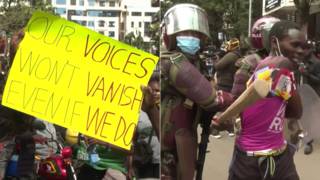
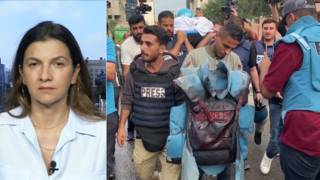
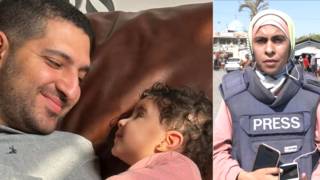
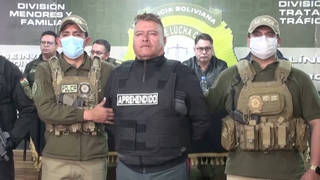
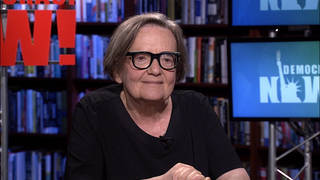
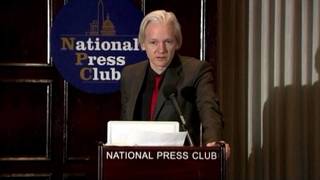


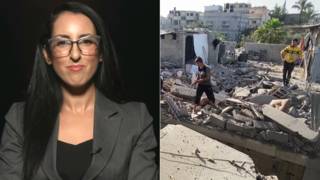

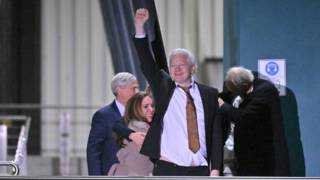
Media Options